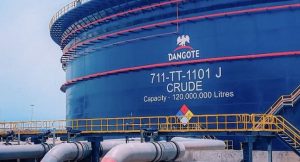Dangote Petrol Delays: Marketers Await Delivery Dates
In a development that raises eyebrows across Nigeria’s oil sector, marketers find themselves in limbo as the Dangote refinery extends its petrol delivery dates. This situation sparks concerns about the impact on fuel supply and pricing in a country already grappling with energy challenges. The refinery, touted as a game-changer for Nigeria’s oil industry, has yet to fulfill its promise of timely deliveries, leaving many stakeholders anxious about the implications for both consumers and the broader market.
The Dangote refinery, which began production earlier this year, was expected to alleviate some of the fuel supply issues that have plagued Nigeria for years. However, as the delivery dates continue to shift, marketers remain uncertain about when they will receive the refined products they desperately need. This delay is not just a minor inconvenience; it carries significant ramifications for the supply chain and fuel availability across the nation.
Marketers express frustration over the ongoing delays. “We expected a reliable supply, but now we wait with no clear timeline,” says Abubakar Maigandi, the National President of the Independent Petroleum Marketers Association of Nigeria (IPMAN). “This uncertainty makes it difficult for us to plan and effectively serve our customers.” The delays have already led to fuel scarcity at various filling stations, compounding the challenges consumers face as they rely on consistent fuel access for their daily activities.
One primary reason for the extended delivery dates appears to be issues with crude supply. The Dangote Group has publicly stated that it struggles to receive enough crude oil from domestic producers to meet its refining needs. In a recent statement, Anthony Chiejina, Chief Branding and Communications Officer for Dangote, highlights the difficulties in securing adequate feedstock. “We have never accused NNPC of not supplying us with crude. Our concern has always been NUPRC’s reluctance to enforce the domestic crude supply obligation,” he explains. This lack of enforcement leaves the refinery struggling to secure the necessary inputs for production, leading to delays in product delivery.
Furthermore, the Nigerian National Petroleum Company (NNPC) faces criticism for not fully supporting domestic refiners. While the NNPC works on rehabilitating its own refineries, many in the industry argue that it should prioritize supplying crude to local refiners like Dangote’s. The ongoing tension between the NNPC and Dangote raises questions about the future of Nigeria’s oil market and its ability to meet domestic demand.
As marketers await the promised products, the situation complicates further. The Nigerian Midstream and Downstream Petroleum Regulatory Authority (NMDPRA) recently halts imports, directing all marketers to source products exclusively from Dangote. This decision meets resistance, as many in the industry feel it unfairly favors one player in a market that desperately needs competition. “We cannot rely heavily on one refinery to feed the nation,” says Farouk Ahmed, the Chief Executive of NMDPRA. “This is not good for energy security or market stability.”
The implications of these delays extend beyond just fuel availability. With ongoing uncertainty, prices at the pump likely fluctuate, further burdening consumers who already face economic challenges. The landing cost of petrol has reportedly risen to ₦1,117 per litre, yet many consumers still pay subsidies, complicating the pricing landscape. As marketers wait for clarity from Dangote, the specter of rising fuel costs looms large.
In the midst of these challenges, some stakeholders call for a more competitive market environment. They argue that if Dangote’s products were truly competitive, marketers would naturally gravitate toward them. However, the current regulatory framework appears to stifle competition, leading to a situation where marketers feel trapped. “If the regulator says everybody should queue behind Dangote, it frustrates other investments and enhances Dangote’s business at the expense of others,” says an industry insider.
Despite these challenges, a glimmer of hope remains that the situation may improve. The Dangote Group invests heavily in infrastructure, including pipelines, to facilitate smoother operations in the future. However, until these issues resolve, marketers will continue to face uncertainty, and consumers will remain at the mercy of fluctuating fuel prices.
As the situation unfolds, it becomes clear that the future of Nigeria’s oil market hinges on the ability of stakeholders to navigate these challenges collaboratively. The need for a balanced approach that supports both local refiners and marketers proves crucial for ensuring a stable and reliable fuel supply for all Nigerians. Until then, the wait for Dangote petrol continues, and the implications for the broader market remain to be seen.

In conclusion, the ongoing delays in petrol delivery from the Dangote refinery highlight the complexities of Nigeria’s oil market. As marketers await clarity and consumers face rising prices, the need for a cohesive strategy to address these challenges has never been more pressing. The coming weeks will be critical in determining whether the Dangote refinery can fulfill its promise of transforming Nigeria’s energy landscape or whether the current issues will continue to hinder progress.

